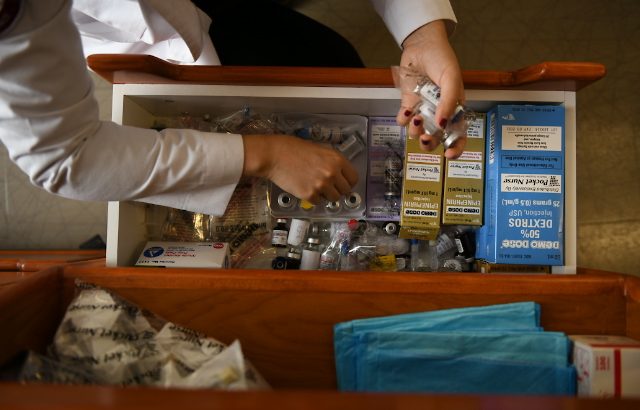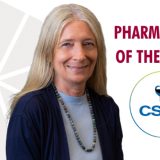
Chapman Leads Change in Patient Safety, Launches PS-CARE
November 27, 2023
After almost a decades-long history of focusing teaching, research, and practice on the critical importance of patient safety, Chapman University has launched a new center dedicated to the thoughtful and intentional approach of patient safety. Founded on the principles of research, education, and community engagement, the Patient Safety Center for Research and Education (PS-CARE) tackles two of the most critical healthcare issues of our time: preventing medication errors and managing opioid use disorder (OUD).
Fueled by the wealth of talent that supports this groundbreaking initiative, PS-CARE serves as a foundational piece for the movement in the Orange County community as the world embraces and leans into more patient-safety-centered approaches in its healthcare practices. PS-CARE has brought together a diverse and highly skilled team of faculty members that aims to provide interdisciplinary collaboration to address some of the most pressing patient safety concerns today, including medication error prevention, opioid overdose prevention, OUD treatment, prescribing errors, and safe medication disposal. These topics further splinter into more niche research areas, for example, evaluating medication errors during patient transition from hospital care to a skilled nursing facility.
Under the guidance of Dr. Marc Fleming, a health services researcher with expertise in behavioral theory, the core PS-CARE members are each part of at least one of three teams that cover the initiatives of PS-CARE: The research team, the education team, and the community engagement team.
Education
PS-CARE’s education goals align with broader healthcare trends, such as the transition towards value-based care and the growing emphasis on patient-centered approaches by disseminating knowledge, best practices, and evidence-based guidelines to healthcare professionals. By focusing on preventing medication errors and effectively managing OUD, PS-CARE offers ethical and financially prudent strategies that can transform healthcare systems for the better in a sustainable model.
Another core component is an emphasis on education geared toward preventing medication errors. Through comprehensive training programs tailored for healthcare practitioners across diverse healthcare settings, PS-CARE equips professionals involved in patient care with the skills necessary to deliver safe, high-quality services, which extends to addressing inappropriate prescribing practices, reducing adverse reactions, and promoting the concept of evidence-based prescribing and personalized medicine.
PS-CARE offers continuing education (CE) programs for healthcare professionals to remain updated with evolving standards, regulations, and technologies in their division of practice. This continuous learning process plays a conditioning role in equipping healthcare practitioners with the knowledge needed to provide compassionate care to their patients. CUSP faculty have been an integral part of the Patient Safety Movement Foundation and will continue to expand their educational efforts through programming supported by PS-CARE.
Additionally, education will focus on pharmacists and the community about the importance of naloxone and buprenorphine in the management of OUD and overdose prevention, including strategies to reduce stigma and adopt multidisciplinary approaches to managing OUD.
Research in Promoting Medication Safety
The collaborative efforts of the center reflect a holistic approach to patient safety. In bridging the gap between health outcomes researchers and clinicians, PS-CARE ensures that evidence-based solutions are developed and effectively implemented in healthcare settings. This commitment holds the promise of enhancing patient safety, improving healthcare outcomes, and ultimately saving lives in the face of these critical challenges.
With a growing emphasis on implementation science, PS-CARE aims to create synergistic solutions by utilizing the wealth of knowledge and expertise at CUSP, while also exploring opportunities to build new external collaborations. Ultimately, by conducting research and developing education, PS-CARE will lead to improved health outcomes for the greater Orange County community and the opportunity to have international influence.
Community Engagement in Safe Medication Disposal
Beyond its immediate role in healthcare, PS-CARE extends its reach into the communities near our programming and partners, combating drug overdose and diversion by championing responsible disposal of unused medication. Proper disposal of prescriptions for controlled substances safeguards vulnerable individuals and also contributes to the preservation of local water supplies and the environment.
Participation in take-back programs and responsible disposal is a collective effort to ensure a safer and healthier community. PS-CARE and Chapman University are proud to serve as community resources, providing informative updates on medication disposal kiosks and other safe medication disposal methods, such as Deterra®, to protect the community.
Teams
The Patient Safety Center for Research and Education’s commitment to research, education, and community engagement is actively reshaping the future of patient safety and medication management. The talented 12 core team members are distributed to each team below, some of whom are part of multiple teams:
Research Team: Dr. Laressa Bethishou, Dr. Lawrence “LB” Brown, Dr. Khaled Elsaid, Dr. Marc Fleming, Dr. Amy Kang, Dr. Moom Roosan, and Dr. Enrique Seone-Vazquez
Education Team: Dr. Laressa Bethishou, Dr. Lawrence “LB” Brown, Dr. Khaled Elsaid, Dr. Marc Fleming, Dr. Jeff Goad, and Dr. Jerika Lam
Community Engagement Team: Dr. Marc Fleming and Dr. Karl Hess

